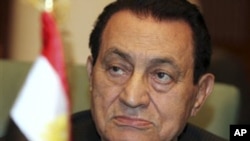Egypt is holding parliamentary elections later this month and some Middle East experts are saying the results could be a test of the Obama administration's commitment to democracy.
On November 28 Egyptians will go to the polls to elect their new parliament in balloting that could be a preview of next year's presidential elections.
Egyptian President Hosni Mubarak has promised that the parliamentary vote will be free and fair, but Michele Dunne, a senior associate at the Carnegie Endowment for International Peace in Washington, says the elections pose major challenges. "The signs are not very positive for having free elections. There have been a lot of steps that the Egyptian government has taken recently to cut down the size of opposition, to diminish the number of opposition candidates who can run, to encumber their freedom to campaign, to control media coverage of the elections and prevent the opposition from using technological means like text messages and so forth to mobilize for the elections," he said.
She says that is why the U.S. State Department put the Egyptian government on notice about what it considers are requirements for free and fair balloting. State Department spokesperson Philip Crowley called on Egypt to allow peaceful political gatherings during the campaign, international observers, balanced media coverage of all the candidates and an impartial mechanism to review election-related complaints.
Karim Haggag, director of the Egyptian Information Office in Washington, says Egypt has already fulfilled most of these requirements. "These elections will be supervised and administered by a high elections committee which is independent. They are headed by senior judges from the Egyptian judiciary. There is a coalition of Egyptian society organizations. Between them they will field roughly 3,000 monitors to supervise these elections. By law candidates' representatives will be present at the polling stations and also these will be open to the media of course, so I think taking these things together you have a very robust system of safeguards that will insure that these elections will be free and fair," Haggag said.
Haggag, however, ruled out the idea of international election monitors, saying it is not acceptable to the Egyptian government and Egyptian people.
But Edward Walker, a former U.S. Ambassador to Egypt, takes the opposite view. He argues that if the Egyptian government wants to make its election process more transparent, international monitors should be allowed in. "What we would like to see, what the American people would like to see, is an Egypt that is going forward, not backwards. And the fear was that in some senses, the Egyptian election process is a step backward and it is not forward. It is up to the Egyptian people. It is not something that the U.S. can or should dictate, but neither should we be quiet about what we believe in. So I think it is appropriate for the administration to review what is going on," he said.
The Carnegie Endowment's Michele Dunne says the Egyptian balloting also could be seen as a test of the Obama administration's commitment to democracy in the Arab world. Dunne says this is because Washington faces the difficult choice between supporting the Egyptian people's aspirations for democracy, and maintaining the close strategic relationship with the Egyptian government.
"I do think people in other Arab countries are going to be watching the U.S. -- and Europe,- and outside players -- to see to what extent they press for free and fair elections in Egypt. And they are going to take that as a sign of whether the U.S. and also Europe, which is an important player here, are serious about these issues or whether these issues have largely been relegated to the sidelines," Dunn said.
Saad Eldin Ibrahim, an Egyptian-American political sociologist and democracy activist, argues that the Egyptian balloting could be crucial to the spread of democracy in the entire Middle East. "Egypt is the biggest Arab country in the Middle East. It is the center of the Arab world; it has always led culturally and politically. And if the election is carried out freely and fairly, Egypt can hope to lead the democratic transformation of the region and, in such case, the Arab world will join in the third wave of democracy which has swept the globe since 1974," Ibrahim said.
Ibrahim says the least the Obama administration can do is to not recognize the election results if it can be shown that the balloting was unfair or not free. If that happens, he says the United States should make it clear to the Egyptian government that it will stand by the Egyptian people in their quest for democratic Egypt.
Egypt to Hold Parliamentary Elections This Sunday




